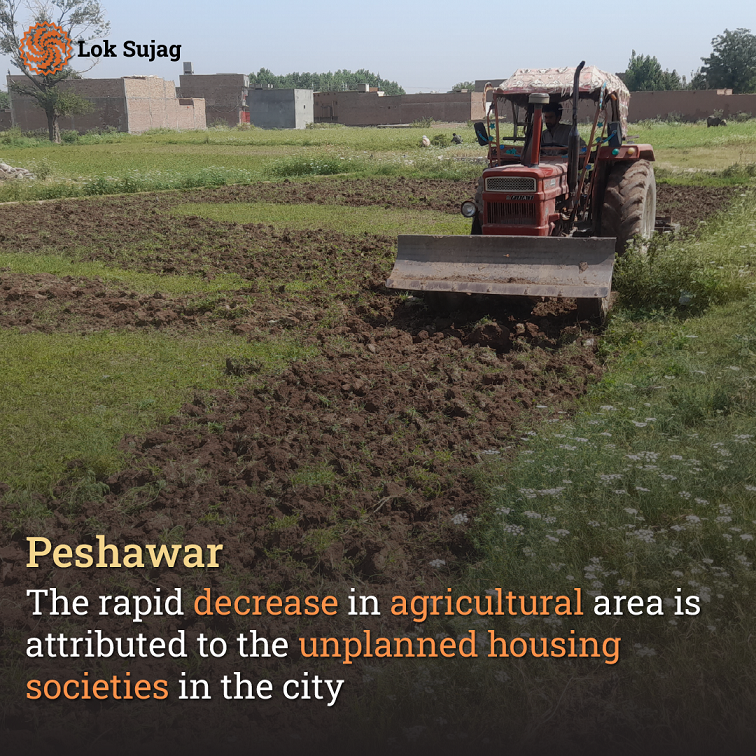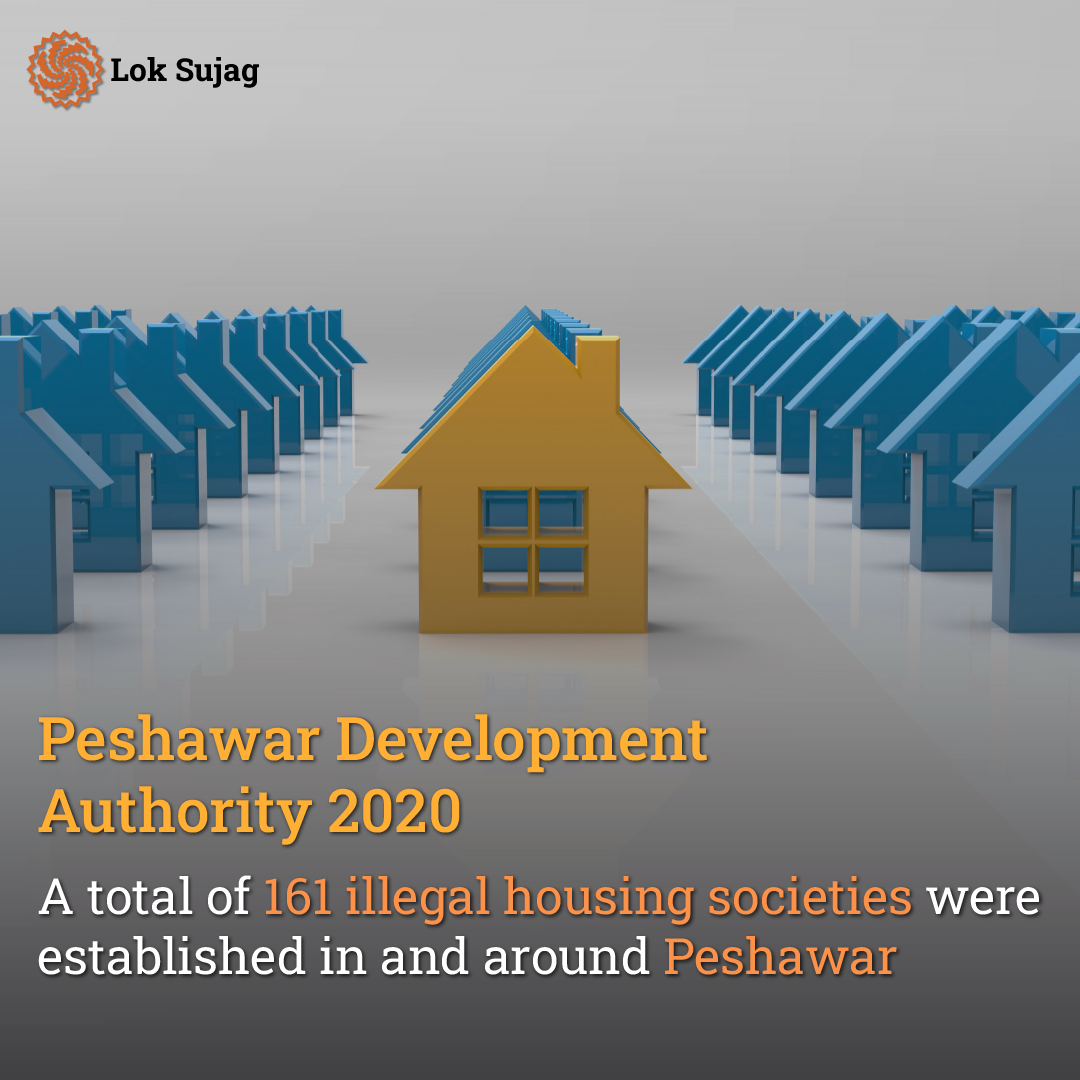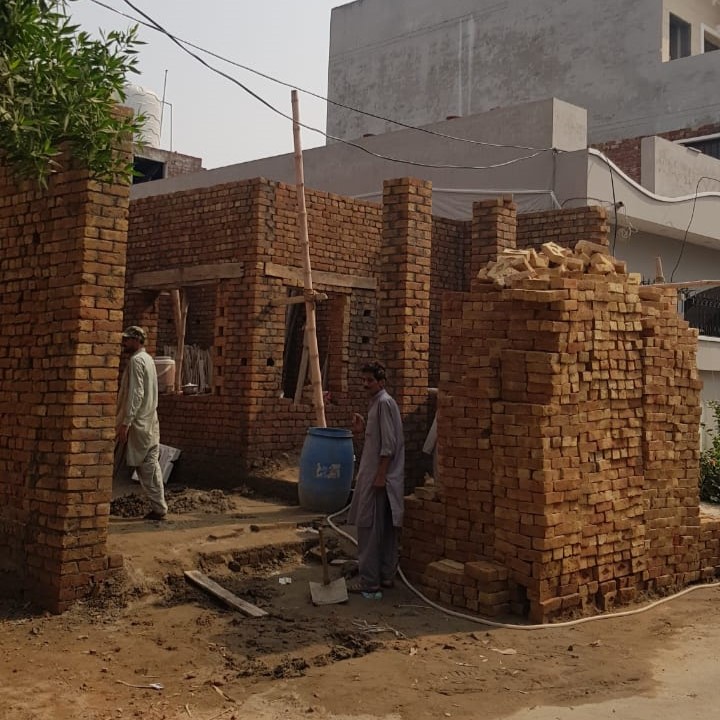Javed Ali, a 40-year-old farmer, resides in Sefid Dheri village near Peshawar Ring Road. He cultivates fodder for his animals on his one-acre land.
He mentions that his father and grandfather also cultivated wheat, vegetables, and fodder on over 30 acres of land in the same village. However, the situation has now drastically changed.
“The land was not ours. After my grandfather, my father and two uncles used to cultivate the land owned by a local landowner on a share basis [where the owner covers expenses, while the farmer maintains the farm and receives half the share in the produce]. Then the owner sold the land to a property dealer.”
Seventy-year-old Akhtar Muhammad lives in Achini village, five kilometres (km) east of Peshawar city. For years, he managed 20 acres of land from different people. However, now he only grows the vegetables needed for his household.
The construction of residential colonies on agricultural land saddens Akhtar Mohammad. According to him, water was also available here as per the needs of the crops, but the people chose to sell the lands. The fields have vanished, and now buildings are being built in their place.

Bahadur Ali Khan has been the Director of Building Control at the Peshawar Development Authority (PDA) since 2015. He oversees private housing projects in the city and its suburbs.
He explains that with the implementation of the new local government system in 2021, he now holds the responsibility for supervising residential and commercial projects within the limits of the PDA. However, beyond the PDA’s jurisdiction, the building control powers have been transferred to the Tehsil Municipal Administration (TMO).
He explains that as per the Land Protection Act 2021, committees have been established at both district and tehsil levels to oversee housing projects. These committees are responsible for reviewing applications and issuing NOCs or permits accordingly.
According to Bahadur, 237 applications for small and large projects were received from January 2018 to November 2021. Among these, permits have been issued for eight commercial and residential projects, while 18 are under scrutiny.
As per PDA documents, 161 illegal housing societies were constructed in the city and its surroundings in 2020.

Bahadur explains that these societies have yet to obtain approval from PDA or acquire the necessary NOCs. Consequently, legal actions have been taken against them. Construction works have been halted, and the offices of some societies have been sealed. 33 of these societies are facing pending cases in NAB.
Syed Muhammad, who belongs to Achini Chowk on the Ring Road, shares that during the military operation, a significant number of people migrated from the tribal areas. Many purchased lands in various parts of Peshawar and constructed houses there.
He explains, “As the land prices escalated, the local people sold their agricultural land, and residential schemes were established. We are unsure whether these societies are legal or illegal, but one thing is certain – these lands can no longer be used for farming.”
Dr Murad Ali Khan is the Director of Flood Operations in the Directorate General Extension of the Agriculture Department. With the new law’s implementation, he is now responsible for overseeing residential projects on agricultural lands.

Dr is not happy with the growing number of housing schemes. He feels that agricultural land is being converted for residential and commercial use without proper planning.
Procedure for approval of residential or commercial schemes
Bahadur explains the approval procedure for residential or commercial schemes under the Act of 2021. He says the landowner submits their application and the necessary documents to the Deputy Commissioner’s office.
The owners are requested to submit maps and other documents. A committee led by the Deputy Commissioner inspects the site and carefully examines the records. The DC office issues the permit after obtaining approval from various agencies.

After the permit is issued, the project undergoes regular monitoring. According to the new law, the PDA or TMA holds 35 per cent of the entire scheme’s plot as a cash guarantee. The plots are returned to society in proportion to the development work completed.
Land Protection Act 2021
Under the Land Protection Act 2021, the district committee approves the residential schemes. This committee comprises the deputy commissioner, assistant commissioner of the respective tehsil, district agriculture officer, tehsil chairman, and environmental and local government officials.
Dr Murad explains that previously, any residential project required a minimum of 160 kanals of land. However, this limit has been reduced to 10 kanals under the new law. Now, the approval of each project is subject to the issuance of a NOC by the Agriculture Department.

“The agriculture department evaluates the land. We do not allow construction projects if an area has low agricultural productivity. This is because, in the future, with modern technology, it will be possible to grow crops even on barren lands.”
The Land Conservation Act states that the Department of Agriculture conserves agricultural land in provincial and district-level committees. Only after their approval another department will be able to assess a project. In case of violation of the law, the individual or the company can be punished with a fine of one million rupees and imprisonment for three to ten years.
According to the provincial agriculture department, the total area of Peshawar district is 126,661 hectares. Out of this, 78,854 hectares are under cultivation. The agency states that water is available to irrigate all the land except 2,400 hectares.
Also Read

Illegal housing societies: TMA-LDA wrangling makes life of lower-middle class houseowners miserable
According to the Mouza Census 2020, the Peshawar district comprises 318 mouzas. Among these, 265 are categorised as rural districts, 35 have been designated as urban, and 18 have been classified as semi-urban.
Dr Murad claims that residential and commercial projects have occupied 37 per cent of Peshawar’s agricultural land. However, no official statistics are available to confirm or refute this claim.
According to official statistics, Peshawar’s urban population was 2 million 26 thousand 851 in 2017, which has increased to around 24 lakhs. A review of census records since 1997 indicates that the city’s population is growing annually at 3.99 per cent.
The Urban Policy Unit of Khyber Pakhtunkhwa estimates that an additional 987 acres of land will be required to house the urban population from 2019 to 2039, considering the pace of Peshawar’s expansion.
Dr Murad points out that while the effects of the land protection law will take time to become apparent, one thing is certain: the agricultural land in Peshawar district is rapidly decreasing.
Published on 8 Aug 2023




















